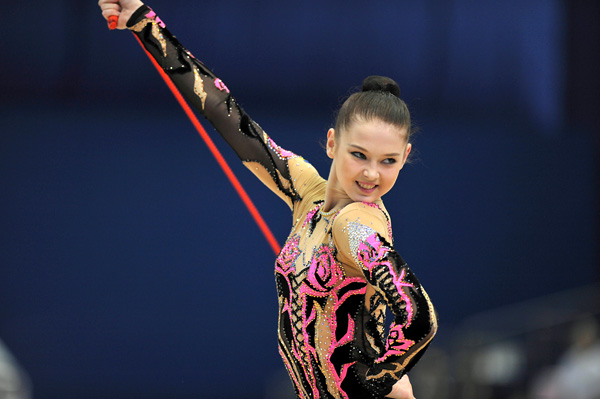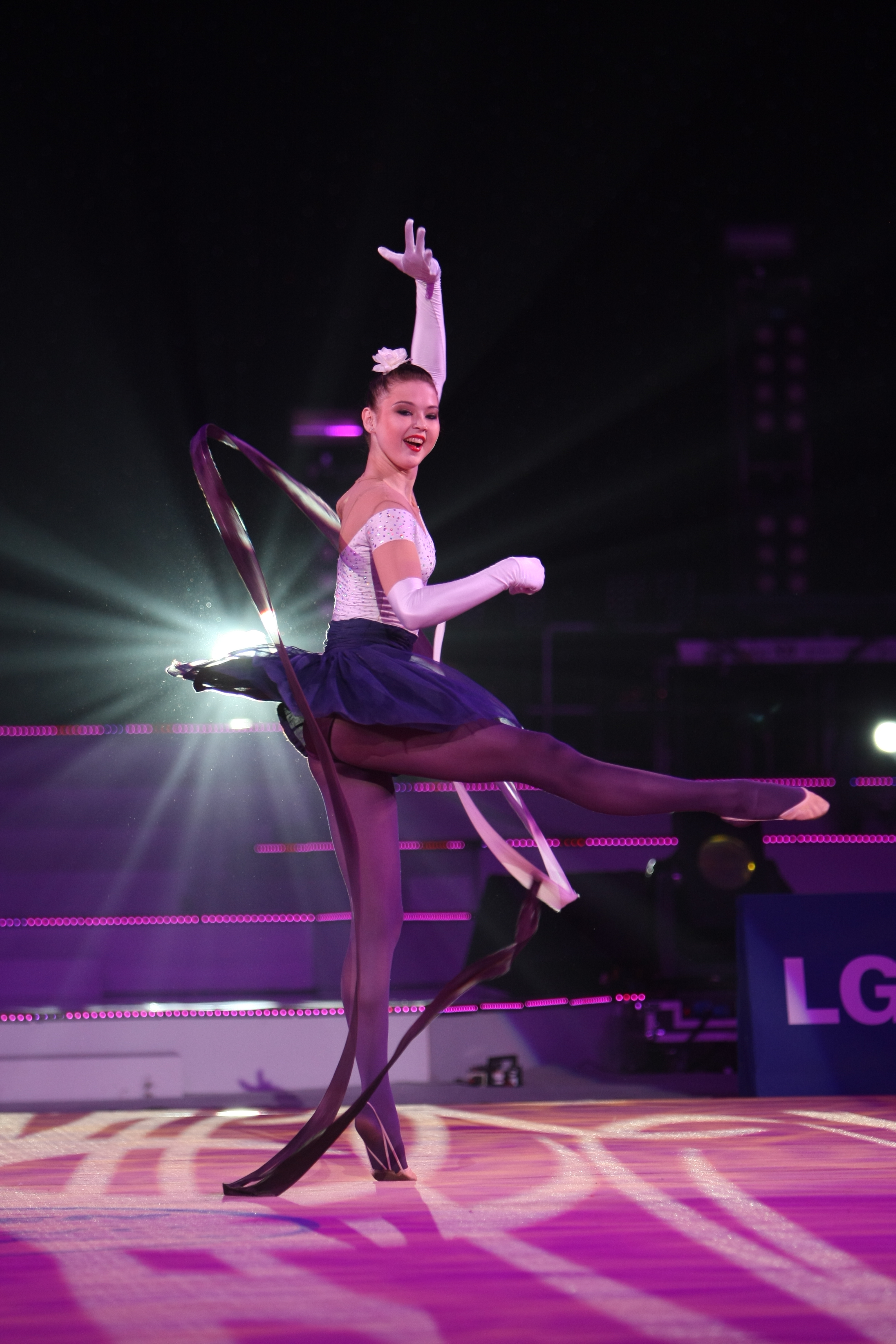1. Early life and background
Alina Oleksandrivna Maksymenko was born on July 10, 1991, in Zaporizhzhia, which was then part of the Ukrainian SSR in the Soviet Union. Her hometown is Kyiv. Standing at 69 in (174 cm) tall, she trained at the renowned Deriugins School, a prominent rhythmic gymnastics club in Ukraine. Her head coach was Albina Deriugina, with Irina Deriugina serving as an assistant coach and Irina Grischenko as her choreographer.
2. Rhythmic Gymnastics Career
Alina Maksymenko's rhythmic gymnastics career spanned from her junior years through a successful senior career, where she competed both as part of a group and as an individual athlete, culminating in an Olympic appearance and multiple international medals before her retirement.
2.1. Junior career
During her junior career, Alina Maksymenko showed early promise. At the 2006 Deriugina Cup, a significant event in the rhythmic gymnastics calendar, she earned a silver medal in the All-around competition, placing just behind Russian gymnast Daria Kushnerova.
2.2. Senior career
Alina Maksymenko's senior career saw her evolve from a group competitor to a distinguished individual gymnast, achieving peak performances at major international events including the Olympic Games and World Championships.
2.2.1. Early senior years (2007-2008)
Maksymenko made her debut at the Rhythmic Gymnastics World Championships in 2007, held in Patras, Greece. She competed as part of the Ukrainian senior group, which included Olena Dmytrash, Polina Kondaurova, Viera Perederiy, Oksana Petulko, and Vita Zubchenko. The group finished 8th in the Group All-around competition. In 2008, Maksymenko continued her participation as a member of the Ukrainian Group at the 2008 Summer Olympics in Beijing, China, where they once again finished eighth in the group all-around finals. That same year, at the 2008 World Cup Final in Benidorm, she secured two bronze medals: one in the 3 hoops/4 clubs category and another in the 5 ropes event.
2.2.2. Individual career breakthrough (2009-2011)
In 2009, Maksymenko transitioned to competing as an individual gymnast. She participated in the 2009 World Rhythmic Gymnastics Championships in Ise, Mie, Japan, where she placed 16th in the all-around final. Later that year, at the 2009 World Games in Kaohsiung, Taiwan, she achieved notable placements, finishing 5th in Hoop, 6th in Ribbon, 7th in Rope, and 8th in Ball. At the 2009 Rhythmic Gymnastics European Championships in Baku, she earned a team bronze medal.

Her individual success continued at the 2010 World Rhythmic Gymnastics Championships in Moscow, Russia, where she secured a 5th-place finish in the all-around final. Notably, she was one of only two gymnasts at the event to qualify for all individual apparatus finals, placing 4th in Rope, 5th in Hoop, 6th in Ball, and 8th in Ribbon. The 2011 season was particularly strong for Maksymenko; she won three gold medals and one silver medal at the Deriugina World Cup.

At the 2011 Summer Universiade held in Shenzhen, she claimed a silver medal in the hoop final with a score of 28.100, and a bronze medal in the clubs final. Maksymenko also played a crucial role in helping Ukraine secure the team bronze medal at the 2011 World Rhythmic Gymnastics Championships in Montpellier, France. Her strong performance, finishing 5th in the All-around final, ensured her qualification for the 2012 Summer Olympics in London. Furthermore, at the 2011 Rhythmic Gymnastics European Championships in Minsk, she contributed to a team bronze and also won an individual bronze medal in Clubs.
2.2.3. Olympic participation and peak performance (2012)
The 2012 season began with Maksymenko competing at the LA Lights in Los Angeles, where she faced challenges with her new routines and finished behind fellow Ukrainian gymnast Ganna Rizatdinova in the all-around. She later competed at the 2012 Deriugina Cup, earning a silver medal in the all-around behind Russian gymnast Daria Dmitrieva. The highlight of her year was her participation in the individual all-around event at the 2012 Summer Olympics in London. She successfully qualified for the finals and achieved a significant career milestone by finishing 6th overall.
2.2.4. Final season and retirement (2013)
Maksymenko's final competitive season in 2013 was marked by numerous strong performances. She won a silver medal in the all-around at the 2013 LA Lights, again behind her teammate Ganna Rizatdinova. At the 2013 Holon Grand Prix, she finished 12th in the all-around but secured a gold medal in the clubs final. Her first World Cup competition of the season in Lisbon, Portugal, saw her finish 5th in the all-around. She continued to collect medals, winning silver in the all-around and bronze in clubs at the 2013 Irina Deleanu Cup, and another bronze medal in the hoop final at the Pesaro World Cup. An aggravated injury led her to withdraw from the Sofia World Cup.
At the 2013 Rhythmic Gymnastics European Championships in Vienna, Austria, Maksymenko, alongside teammates Ganna Rizatdinova and Viktoria Mazur, earned a team silver medal. She also won silver in the All-around at the International Trophy "Ciutat de Barcelona", finishing behind Russian gymnast Alexandra Merkulova. At the 2013 Summer Universiade in Kazan, she placed 4th in the all-around, again behind Rizatdinova. She won a silver medal in clubs, tied with Rizatdinova, and a bronze medal in hoop, also tied with Rizatdinova. Maksymenko, Rizatdinova, and Mazur were featured in an editorial in the August 2013 edition of Vogue Ukraine. She also competed at the 2013 World Games in Cali, where she secured bronze medals in both ball and clubs. Maksymenko concluded her career at the 2013 World Rhythmic Gymnastics Championships in Kyiv, Ukraine, where she won a bronze medal in the Clubs final and finished 7th in the All-around. Following the end of the 2013 season, she retired from competitive gymnastics and accepted an invitation from her former coaches at the Deriugins School to begin a career in coaching.
3. Coaching Career
Following her retirement from competitive rhythmic gymnastics at the end of the 2013 season, Alina Maksymenko transitioned into coaching. She began her coaching career at the prestigious Deriugins School, the same institution where she trained as an athlete. Since 2023, she has been working at the iSTAR Academy located in West Sussex, Great Britain. Maksymenko currently serves as a coach for the senior national group, which notably competed at the 2024 European Championships.
4. Personal Life
Alina Maksymenko is fluent in three languages: Ukrainian, English, and Russian. Since 2023, she has been based in West Sussex, Great Britain, due to her coaching position at iSTAR Academy.
5. Performance Details
This section provides specific technical and statistical information regarding Alina Maksymenko's rhythmic gymnastics performances, including the music utilized for her routines and her detailed scores from the Olympic Games.
5.1. Routine music
The following table lists the music used for Alina Maksymenko's rhythmic gymnastics routines by year and apparatus:
| Year | Apparatus | Music title |
|---|---|---|
| 2013 | Hoop | "Taken 2 (Main Theme)", "Murad Arrives", "In The Van", "Love The Way You Lie" by Nathaniel Mechaly, Eminem, Rihanna |
| Ball | "Gratta Keka" by Appart | |
| Clubs | "Fever" by A Fine Frenzy | |
| Ribbon | "Taiko Music", "African Djembe Drums", "Chinese Music of Beijing", "Loud Taiko Drumming of Japan", "Sogoni Coun" by Drums Of The World, Madou Djembe | |
| 2012 | Hoop | "Mercy In Darkness","Archangel","Titan Dune" by Two Steps from Hell |
| Ball | "Mission Impossible Theme" by David Garrett | |
| Clubs (New) | "Tamacun", "Diablo Rojo" by Rodrigo Y Gabriela | |
| Clubs (First) | "Angry Birds Main Theme" by London Philharmonic Orchestra & Andrew Skeet | |
| Ribbon | "Asturias" by Joja Wendt | |
| 2011 | Hoop | "Technologique Park" by Orbital |
| Ball | "Private Investigation" by Dire Straits | |
| Clubs | "No Hay Problema" by Pink Martini | |
| Ribbon | "España Caní", "España Caní" by Manhattan Pops Orchestra, Trio Norté |
5.2. Detailed Olympic results
The tables below present Alina Maksymenko's detailed scores from her appearances at the Olympic Games.
| Year | Competition Description | Location | Music | Apparatus | Score-Final | Score-Qualifying |
|---|---|---|---|---|---|---|
| 2012 | Olympics | London | All-around | 109.625 | 110.025 | |
| Asturias by Joja Wendt | Ribbon | 27.450 | 26.800 | |||
| Mission Impossible Theme by David Garrett | Ball | 26.675 | 28.125 | |||
| Mercy In Darkness, Archangel, Titan Dune by Two Steps From Hell | Hoop | 27.950 | 27.300 | |||
| Tamacun, Diablo Rojo by Rodrigo y Gabriela | Clubs | 27.550 | 27.800 | |||
| Year | Competition Description | Location | Music | Apparatus | Score-Final | Score-Qualifying |
|---|---|---|---|---|---|---|
| 2008 | Olympics | Beijing | Group All-around | 31.100 | 31.625 | |
| Summer by Antonio Vivaldi | 5 Ropes | 15.975 | 15.800 | |||
| Theme music from Avrora by Valeri Tishler | 3 Hoops / 2 Clubs | 15.125 | 15.825 | |||